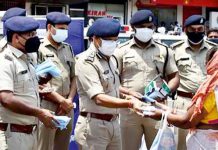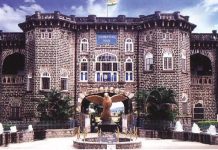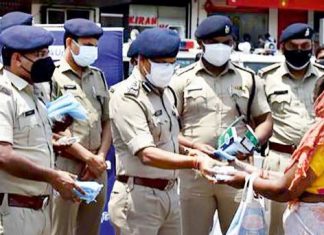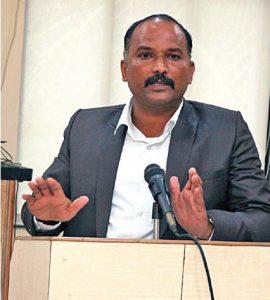 To strengthen base of scientific evidence which plays vital role while investigating any case where scientific evidence would help police to ascertain any cases. Following to which, Police constables have been picked across the Maharashtra who are with chemistry background.
To strengthen base of scientific evidence which plays vital role while investigating any case where scientific evidence would help police to ascertain any cases. Following to which, Police constables have been picked across the Maharashtra who are with chemistry background.
Babasaheb More, the Deputy Director (Provision and Excise) has conducted a several lecture at the Mumbai Forensic Sciences Laboratory (FSL) in Kalina for two batches and trained 52 police constables of each batch.
Speaking to Mumbai Protector, Babasahebh More, said “the training began after Maharashtra government introduced Mobile Forensic Vans (MFV) in 2015 for its police force. However, the staff was not trained to start the services.
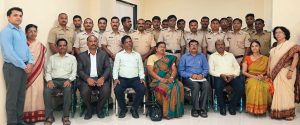 More further said “MFVs are supposed to help police carry out 17 types of test at the scene of the crime, but so far, due to a lack of trained staff, they have only been used to lift fingerprints, which the police can do even without the vans. The officials were selected from each Zone who are from a science background and hold a BSc or MSc degree in chemistry, which is the requisite qualification for an assistant chemical analyser’s post. As they have the required educational qualification and are policemen, they would be more effective in collection of evidence from the crime scene”
More further said “MFVs are supposed to help police carry out 17 types of test at the scene of the crime, but so far, due to a lack of trained staff, they have only been used to lift fingerprints, which the police can do even without the vans. The officials were selected from each Zone who are from a science background and hold a BSc or MSc degree in chemistry, which is the requisite qualification for an assistant chemical analyser’s post. As they have the required educational qualification and are policemen, they would be more effective in collection of evidence from the crime scene”
The classes are conducted for 20 days for each batch were we teach them about Toxicology, Biology, DNA, Ballistics, Chemistry explosive Narcotics and Chemical product, Provision and excise blood alcohol, Voice analysis, Cyber crime, Psychology, Physics, Cow detection Techniques, and Van demonstration. After training them for 20 days, we conduct the exam just to know how they have understood” More added.
Mobile Forensic Vans
A total of 45 MFVs each costing Rs 27 lakh and together amounting to Rs 12.5 crore, were to be provided to police stations across the state. At least 10 of them were handed over to the police in August last year.
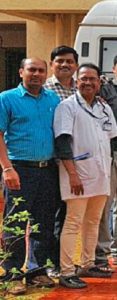 The main reason behind allotment of these vehicles was to ensure that the evidence can be collected scientifically from the scene of crime before it can be contaminated by human error or rain. Currently, the police still have to wait for forensic experts to reach the scene of crime, as against the original plan of having the tests carried out immediately with the help of the van.
The main reason behind allotment of these vehicles was to ensure that the evidence can be collected scientifically from the scene of crime before it can be contaminated by human error or rain. Currently, the police still have to wait for forensic experts to reach the scene of crime, as against the original plan of having the tests carried out immediately with the help of the van.
The proposal for the introduction of MFVs came in 2015, after the Mumbai Police faced flak over shoddy investigation into the seizure of 112 kg of ‘mephedrone (MD or meow meow)’ from the Lonavla residence of dismissed Constable Dharamraj Kalokhe.
Another 12 kg of the same substance was seized from his locker at the police station. However, the police were left red-faced after state Forensic Sciences Laboratories (FSL) found that the seized substance was Mono Sodium Glutamate (MSG), commonly known as ajinomoto.
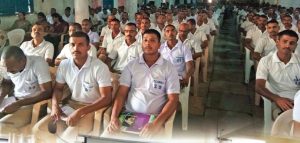 An officer requesting anonymity said that the Mobile Forensic Vans (MFV) are armed with sophisticated equipment to collect samples of blood, DNA, ballistics, narcotics, cyber crime evidence and fingerprints, among others, from the crime scene. “Ideally, it requires a forensic expert to be able to make full use of these facilities,” he said.
An officer requesting anonymity said that the Mobile Forensic Vans (MFV) are armed with sophisticated equipment to collect samples of blood, DNA, ballistics, narcotics, cyber crime evidence and fingerprints, among others, from the crime scene. “Ideally, it requires a forensic expert to be able to make full use of these facilities,” he said.
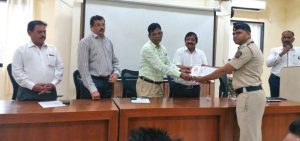 In Theft cases, there is a possibility that the accused may have pushed the door, leaving fingerprints on it. Those need to be collected to ascertain the presence of the accused. In cases where a murder is staged as a suicide, the accused might try to make the victim hold the murder weapon, but the body becomes stiff and if a murder weapon is planted, the fingers would be straight and wouldn’t bend.
In Theft cases, there is a possibility that the accused may have pushed the door, leaving fingerprints on it. Those need to be collected to ascertain the presence of the accused. In cases where a murder is staged as a suicide, the accused might try to make the victim hold the murder weapon, but the body becomes stiff and if a murder weapon is planted, the fingers would be straight and wouldn’t bend.
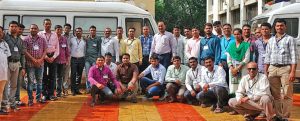 Balu Sanap, a constable posted in Gondia, a Naxal area, says the training will help him handle explosives and identify them. “The training concentrates on handling of explosives. Our area is affected by the Naxal insurgency and this class has been helpful in how to identify, neutralise and gather evidence that will help build a case. While the tests serve as a preliminary tool for investigation and a final test needs to be done at the laboratories to identify the explosives, it will help us determine the course of the investigation,” says Sanap while to speaking to daily newspaper.
Balu Sanap, a constable posted in Gondia, a Naxal area, says the training will help him handle explosives and identify them. “The training concentrates on handling of explosives. Our area is affected by the Naxal insurgency and this class has been helpful in how to identify, neutralise and gather evidence that will help build a case. While the tests serve as a preliminary tool for investigation and a final test needs to be done at the laboratories to identify the explosives, it will help us determine the course of the investigation,” says Sanap while to speaking to daily newspaper.
“We also learnt how to dry a blood soaked cloth. Ordinarily, we used to dry it in the sun or use a hairdryer but now we have learnt that it should be dried at room temperature before sending it to FSL,” he adds.
By Nitesh Poojari

